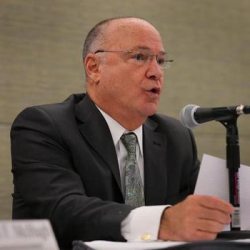Massachusetts Gambling Commission Chairman Stephen Crosby is facing a state ethics investigation over a conflict-of-interest case. Crosby is alleged to have reviewed a casino proposal on land which was owned by a longtime friend, which would breach Massachusetts ethics policies.
Stephen Crosby told the Boston Globe that he has done nothing wrong. The State Ethics Commission has said nothing on the matter, since laws require that their investigations are secret.
Sworn Statement Alleges Wrongdoing
The Boston Globe reported in an article this week that the Ethics Commission received a sworn statement which alleges that Stephen Crosby participated in the casino licensing process, despite having recused himself from those decisions. Earlier, Crosby had stated publicly he was recusing himself, because questions had emerged about his connections to one of the landowners in a land deal involving the casino plan.
The license decision in question involved the Boston-area license, which was considered by all parties to be the most lucrative license of the three considered. The land deal involved the city of Everett, as land surrounding an old industrial plant on the banks of the Mystic River was sold to Wynn Resorts, the gaming company owned by Steve Wynn of Las Vegas. Eventually, the casino license was awarded to Wynn Resorts, which plans to build a $1.6 billion casino on the grounds.
Crosby’s Side of the Story
Stephen Crosby discussed his version of what happened prior to a lawsuit two years ago.
Crosby told the Boston Globe in 2013, “A mutual friend called me and said obscurely, ‘If somebody you knew had an ownership in land that might be involved in a casino proposal, would I want to know or not know?’ I said it doesn’t really matter. This mutual friend said that Lohnes thought it would be better that we not have any contact. I said, ‘That’s fine.’”
Crosby, who was recusing himself at the time, added, “There had been not one iota of discussion either about the Wynn proposal or the land situation prior to my recusal.”
Wynn Resorts Won the License
Wynn Resorts beat out two different set of competitors. In the final stage, Mohegan Sun was partnered with Boston-area horsetrack, Suffolk Downs, which proposed a $900 million casino deal for the city of Revere.
Earlier in the process, Caesars Entertainment’s proposal had been rejected. After Caesars filed a lawsuit against Stephen Crosby, suggesting he had a friend set to make millions in the Wynn Resorts deal, Crosby recused himself from further deliberations. The Caesars lawsuit was a black eye for Crosby’s term on the Gaming Commission, so he tried to distance from the process to avoid the appearance of impropriety.
Possible Results of Investigation
If it was proven that Stephen Crosby continued to manipulate the licensing process after he told the people of Massachusetts he was no longer involved, it would be a major ethics breach and it would be hard to see how he could survive politically. Also, he might be found guilty of crimes.
According to the Boston Globe, the City of Boston has filed a lawsuit against the Massachusetts Gaming Commission, saying the commissioner “violated state law and its own rules” to assure Wynn Resorts would win the licensing process.
Marty Walsh vs Steve Wynn
It was said during the process that Boston Mayor Marty Walsh did not like Steve Wynn and did not try to disguise that animus against the Las Vegas casino developer. Even after the license was awarded, Walsh made hostile statements about Wynn’s coming casino. For his part, Steve Wynn made remarks that suggested he was ready to let the past rest and work with Mayor Walsh. Of course, Steve Wynn had just won a billion-dollar license, so he was in a position to be benevolent and philosophical.
Now, it appears Marty Walsh and the City of Boston are not going to allow the issue to rest. Many in Boston were upset, because it was an open secret that the future of Suffolk Downs was tied to who won the license. The day after the Everett license was announced, Suffolk Downs’s owners announced they would close the 70-year old racecourse. It was reported at the time how Suffolk Downs’s owners had funded the early push for a Boston license, and how it was largely seen as a chance to save a city landmark. Then the state-level gaming officials got involved and a Las Vegas developer had the most lucrative gaming license in the history of Massachusetts.
Defense of Wynn Resorts
Of course, defenders of the Wynn Resorts/Everett plan would argue that Steve Wynn’s plan was much better than the Mohegan Sun/Suffolk Downs plan. With $1.6 billion against $900 million in investment, the Wynn plan naturally would create more construction jobs in the short term and more permanent jobs in the long term. While the Suffolk Downs plan would have maintained a local tradition, horse racing is a troubled industry which increasingly has to be propped up by gaming machines in racino-style venues.
It might be that Stephen Crosby influenced the decision to choose Wynn over Mohegan Sun. He might need to lose his position over that influence. Yet, a perfectly rational Gaming Commission could have made the decision that the Everett casino development was better than the Revere casino project.

